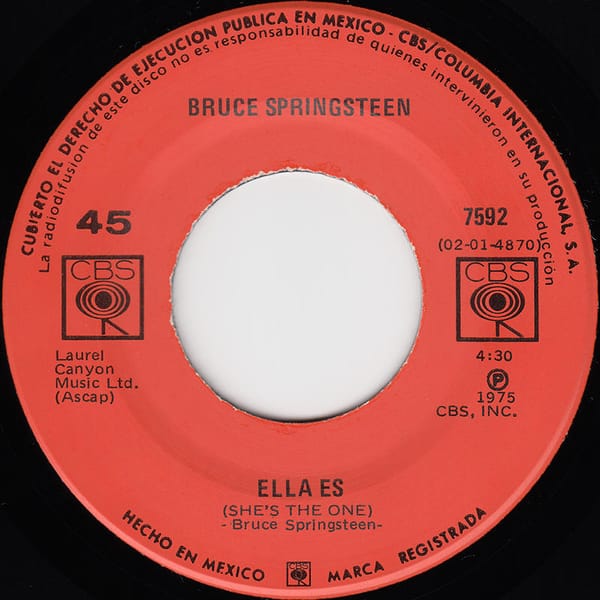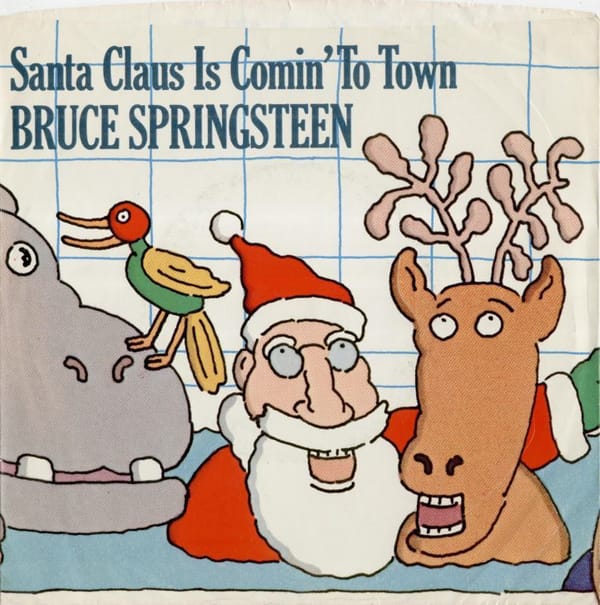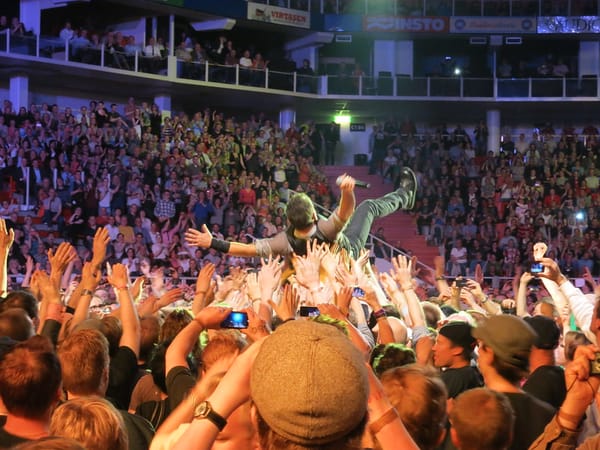The Evolution of Born to Run: "Born to Run"
Side 2, track 1.
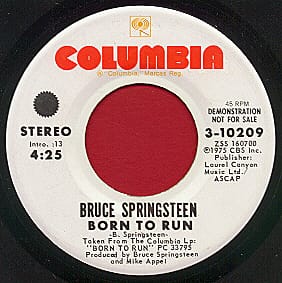
For the 50th anniversary of Born to Run, here's a track-by-track breakdown of the evolution of each of the songs on the record, going in order from start to finish. Side 2, track 1: “Born to Run.”
“I wanted to craft a record that sounded like the last record on Earth, like the last record you might hear…the last one you’d ever NEED to hear. One glorious noise, and then the apocalypse.”
The most important thing about “Born to Run” isn’t how long it took to write, how hard it was to create the sound Bruce Springsteen heard in his head, or how it was impossible to edit in the studio. The most important thing about “Born to Run” is that it became the fulcrum, the major turning point, in how Bruce Springsteen wrote songs. As Bruce himself points out in Songs, “It was the first piece of music I wrote and conceived as a studio production. It was connected to the long, live pieces I’d written previously by the twists and turns of the arrangement.”
That’s important because he couldn’t keep relying on 20 minute epics with lengthy spoken-word stories introducing them as the central focus of the live show. It would have eventually been limiting creatively. And at least in hindsight, he knew that, even if it took him a while to figure out what he wanted to do with that information. In Songs, he notes, “But ‘Born to Run’ was more condensed; it maintained the excitement of ‘Rosalita’ while delivering its message in less time and with a shorter burst of energy. This was a turning point, and it allowed me to open up my music to a far larger audience.”
“Born to Run” was about compression, about taking the power of all of those 50s and 60s songs he was listening to on the turntable next to his bed at 7 ½ West End Court in Long Branch and figuring out how to write songs that would have the same jaw-dropping impact as the epics did. That was a critical decision to make, and a brave one. It would have been way easier for Springsteen to keep writing the kind of songs he had been writing. He had a loyal fanbase and they could have been a great regional act that had pockets of support elsewhere. But somehow he knew it wouldn't be sustainable.
We should be sure to document the personnel who played on the studio version. It is, of course, the only recording on which Ernest "Boom" Carter played drums, and we do not have Roy Bittan’s work here but rather David Sancious on all of the keyboards. There is documentation that shows that the original backing track for the song was recorded on May 21, 1974, after other sessions at 914 Sound Studios where it was rehearsed. The band returned to 914 Studios at the beginning of August for a week of dedicated work and that's when the track was honed into the form we now all know and love. Boom Carter and Davey Sancious departed the E Street Band in mid-August. ("Right before the gravy train!" as Bruce notes in his memoir.)
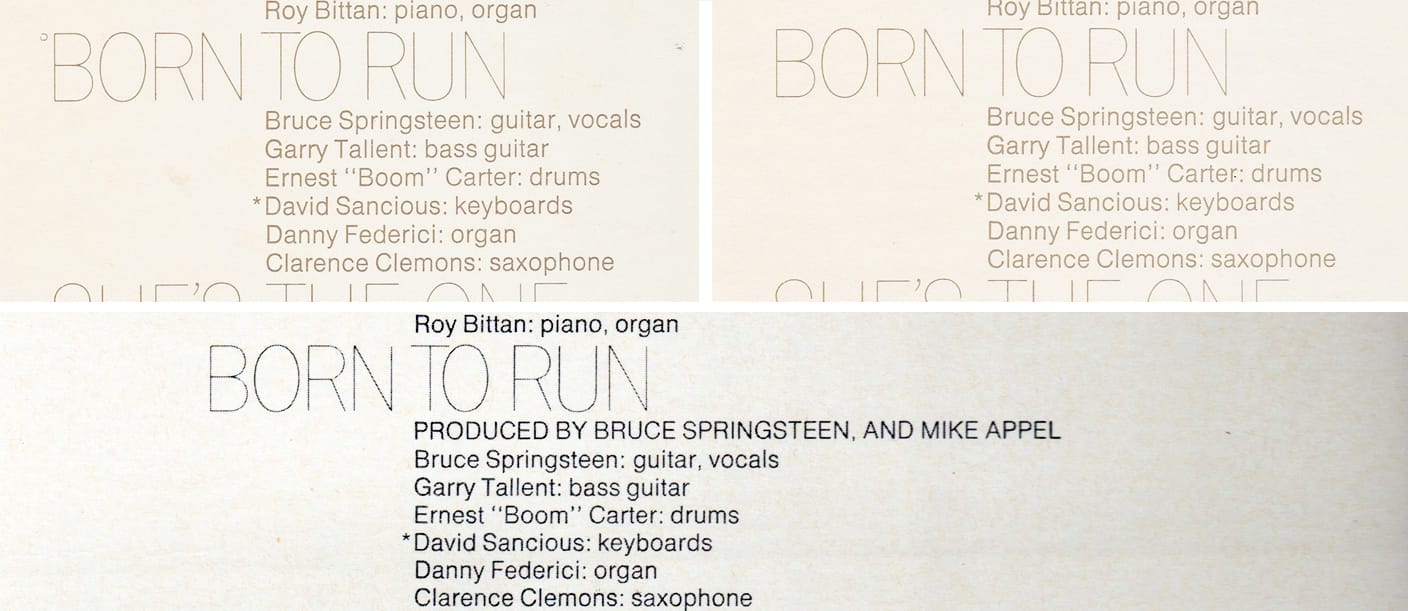
Engineer Louis Lahav corralled 72 tracks in all of their Spectorian glory down to 16 tracks. “I brought it home and played it to wake up to every morning with the sun beaming through my bedroom window. It sounded great. I’d returned home with the exact record I’d wanted to make. That doesn’t happen often,” Bruce declared. A version was played on Ed Sciaky’s radio show on WMMR on November 3, 1974, and as we know, recordings of that appearance (and not the actual tape of the song) got sent onward to other friendly territories.
But Bruce Springsteen didn’t stop being Bruce Springsteen and he still wasn’t happy with the mix, so there was one more attempt in March of 1975. According to Bruce, the label wanted more vocals. This is the one where everyone went slightly crazy. “We took it to a New York studio one evening and in a half hour realized the impossibility of our task,” Bruce writes. “We would never corral that sound again; we couldn’t even come close to the musical integration, the raging wall of guitars, keys and drums…The singer was supposed to sound like he was fighting to be heard over a world that didn’t give a damn.” (Regretfully, this is one version that does not circulate.) More on alternate versions and demos below.
GLORY ROAD
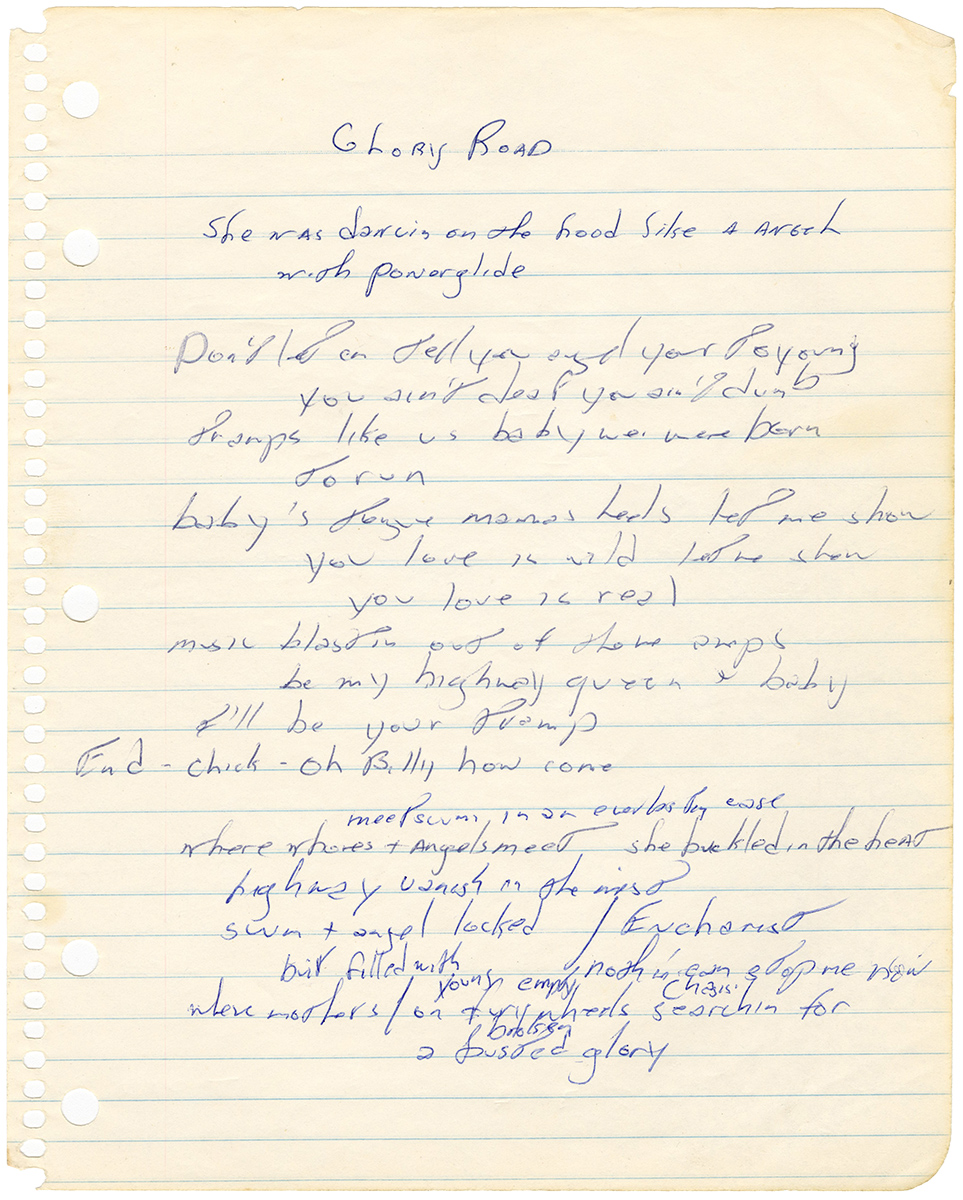
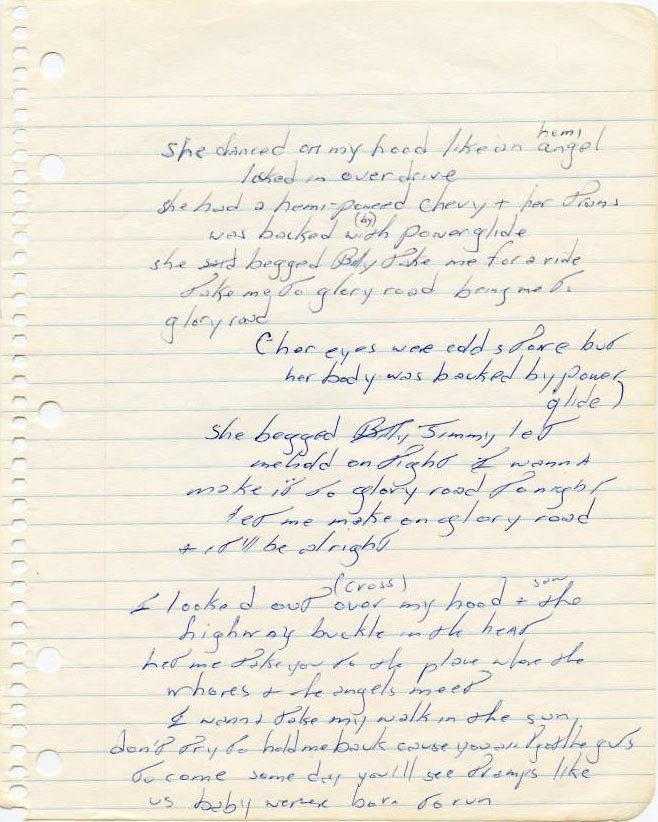
“Glory Road” is believed to be the genesis of “Born to Run,” because of the overall theme of the lyrics, the general imagery, and also because of the presence of some of the song’s formative lyrics. I wish there were publicly available early drafts showing the journey from jotting down a phrase to its final version or that there were more early tapes of fledgling versions. But we do not, and so we are relying on breadcrumbs.
Bruce writes, “The title ‘Born to Run’ I was sure I’d seen somewhere before. It might have been written in silver metal flake on the hood of a car cruising the Asbury circuit, or I may have seen it somewhere in one of the hot-rod B pictures I’d gorged myself on during the early 60s. Maybe it was just out there in the air, floating along on the salt water/carbon monoxide mix of Kingsley and Ocean Avenue on a ‘circuit’ Saturday night.”
“BORN TO RUN” LIVE
The first somewhat-documented live performance of “Born to Run” is allegedly from a show on 4-28-74 at Swarthmore College. That is essentially a Philly gig, because it’s just down the road from the Tower Theater (which, yes, is technically in Upper Darby, PA, but it is a Philly venue). But this is yet another one from “attendee recollections” and there is no tape, so hence "allegedly."
The next documented appearance was about a week later at the Harvard Square Theater in Cambridge, MA, on 5-9-74. The venue also had early and late show slots (can we please bring this trend back??) and the appearance of “Born to Run” is from the late show for which there is no tape recording.
So while this is another show where the setlist was sourced from “attendee recollections” this is much a different situation because 1) the attendee was Jon Landau and 2) he reviewed it for the Real Paper, in the now-infamous “I saw rock and roll future” review. Landau said, “He did three new songs, all of them street trash rockers, one even with a ‘Telstar’ guitar introduction and an Eddie Cochran rhythm pattern.” That description sounds exactly like "Born to Run."
The first appearance of “Born to Run” for which there is a tape is 7-13-1974 at the Bottom Line. (That's a link to a YouTube version of the show with indexes so you can find the specific song.) Musically, the thing is absolutely dialed in. It’s far more energetic and polished at this 1974 show than it is at the early 1975 shows (like Providence or Akron) we’ve discussed here thus far. Given that we know they get the studio recording completed before the departure of their keyboard player and their drummer, the shape and form of the song presented here are about where they should be. It’s completely recognizable and the core of the composition is solid. (Bruce should have felt good about this but probably did not.)
Some interesting lyrics still in progress: “At night we stop and tremble in the heat/With murder in our dreams” in the first verse or “Like animals pacing in a black dark cage/Senses on overload/They're gonna end this night in a senseless fight/They watch the world explode” in the bridge. On the other hand, “I wanna know if love is wild/I wanna know if love is real” is already set in stone.
Apropos “Born to Run” lyrics: I had a roommate freshman year of college who was VERY New Jersey, as was her boyfriend, whose name was “Richard” but his friends called him “‘Chard” and this was, according to them, a common New Jersey vernacular. Not long after I moved in and affixed my Bottom Line poster to my bedroom wall he explained to me that when the song first came out, he and his buddies all thought the line was “the boys try to look like ‘Chard.”
IN THE STUDIO
If you look at the Brucebase page for “Born to Run,” there are no less than 15 different versions, 13 of which are available. I listened to every single one multiple times and my assessments are below, with sound files for some of what I thought would be the more interesting ones. (If you're interested in digging deeper, you can look for the bootleg called The Born to Run Sessions or listen to it on Youtube.)
As per Brucebase, the reason we have all of these is because of Guitar Hero: “The variants…are numerous test mixes and arrangements, with female choir vocals, double-tracked lead vocals, strings, and hard stop organ endings. These are all from the original multi-tracks, and released as downloadable content for the video game Guitar Hero World Tour on January 27, 2009, and subsequently bootlegged.”
While it is absolutely fascinating how these made it out into the world, I do not understand how anyone involved thought any of this was a good idea but I think it’s interesting to see how many things they were willing to try in service of perfection. It is also astounding how close they came to ruining one of the world’s most perfect rock and roll songs.
Bruce Springsteen - 05 Born To Run (Demo) V1b @
Dated to June 26, 1974. As per Brucebase, this is adding Bruce's vocals to the original backing track which was laid down on May 21. Here, you hear a lot of echo, sounds like a drum machine, bad karaoke background. There’s some kind of loud and madly swinging bass line that makes no sense. It gets to the end, the drums are running amok, the bass is dominating so hard its rumbling, Clarence is in the background fighting for attention. It ends acapella? This is nuts, even for a demo, because some of it is finished
Bruce Springsteen - 14 Born To Run (Double Vox + Strings + Female Chorus) V2l @
OH MY GOD IT’S LIKE ZOMBIE BRUCE SINGING because there are two vocals. Then it goes down to one and at least the instrumentation is familiar
THE DOUBLE FEMALE VOX ARE just so awful. It’s like if the Stepford Wives sang.
The sax solo is familiar and you cling to it for dear life because it will protect you from the zombie army
Oh here are the strings on the bridge and it is like the sweetest and most cloying thing ever, and then they just STAY.
The Stepford Wives come in and out. It’s like if someone made a horror movie about The Love Song of J. Alfred Prufrock - “In the room the women come and go / Talking of Michagelangelo”
There’s a giant Nancy Bea/Dodger Stadium organist riff at the very end
Bruce Springsteen - 26 Born To Run (Vox + Basic Instruments) V2h @
This is absolutely fascinating because, as the title reveals, it is just Bruce and some multi-tracked acoustic guitars and a bass line, there is some keyboard presence later, but all of it is at least recognizable and not terrifying. The sax solo is there too. This was fun?
Bruce Springsteen - 27 Born To Run (Drumless Track) V2i @
Same as above.
Bruce Springsteen - 28 Born To Run (Guitar Backing Track) V2j @
This says “guitar backing track” but they mean “bass guitar”
Bruce Springsteen - 29 Born To Run (Vox Only) V2k @
This is AMAZING.
Bruce Springsteen - 30 Born To Run (Early Backing Track) V1a
This is not new news but Garry Tallent fuckin’ swings, man
Bruce Springsteen - 31 Born To Run (Official Backing Track) V2h
No surprises, obviously.
Bruce Springsteen - 32 Born To Run (Less Overdubbing) V2g
“Less” is really really subjective here.
Bruce Springsteen - 33 Born To Run (Hard Female Chorus on 3rd Verse) V2f
I knew I was going to regret listening to this, and I do.
Bruce Springsteen - 34 Born To Run (Female Chorus) V2e
Not just a female chorus, but also double-tracked lead vocals that mysteriously someone decides to then strip the lead vocals down to a fairly rough take that’s kind of fascinating…but then the Stepford Wives come in, and they keep up that pattern throughout the rest of the song, and then there’s what’s clearly supposed to be some kind of angelic chorus over the last verse, interspersed between the string arrangement and then that big organ burst at the end.
Bruce Springsteen - 35 Born To Run (Double Vox + Strings) V2d
This is everything I hate about everything I already listened to, but doubled
Bruce Springsteen - 36 Born To Run (1974 Advanced Tape Radio Stations) V2c
“V4c is a live recording from WMMR Studios in Philadelphia on November 3, 1974, with Ed Sciaky and Bruce playing V4b on the air. The tape was broadcast by several USA radio stations from November 1974 to July 1975.”
TRACKLISTINGS
Again, as previously discussed, these handwritten potential sequences for the record are absolutely fascinating, but what we don’t have is the connecting pieces - what prompted the re-ordering, what dates they happened on, what discussions were had, what other versions are now lost to the annals of time that could inform the conversation.
But what we can see is that “Born to Run” in some form (so we’re counting “Glory Road” as BTR in this equation) was always in the rotation. Bruce Springsteen's instincts on that were solid. No notes.



